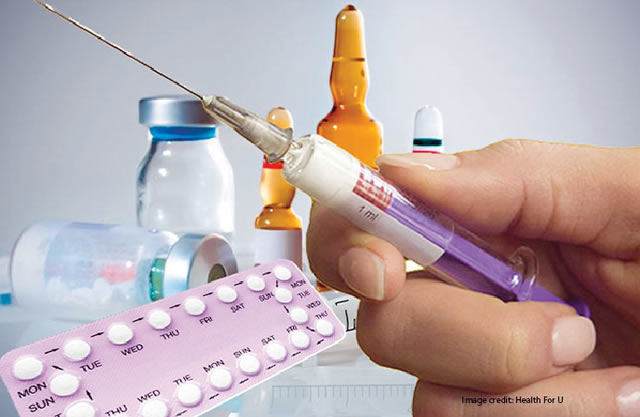The risk of breast cancer is just as high in the mini pill as it is in the combined pill, according to new research.
A study found all hormonal contraceptives carry a small increased risk of breast cancer Hormones in the pills are thought to raise the risk.
But drinking alcohol and smoking can increase breast cancer risk more, a sexual health expert said.
The mini pill, a progestogen-only contraceptive pill, has been linked to higher rates of breast cancer in women who take it regularly in new research — bringing it in line with what is known about other hormonal contraceptives.
The study — published in PLOS Medicine on Tuesday — showed that the relative risk of developing breast cancer linked with taking the progestogen-only pill was similar to that of the combined pill, at around 20% to 30%.
For example, if a woman’s risk of developing breast cancer is 5%, a 20% increase would bring her risk to 6%.
The researchers looked at the records of 10,000 women under 50 years old with breast cancer in the UK, to assess if there is a relationship between hormonal contraceptives and the disease.
Perhaps what we need are more male contraceptive choices
According to the National Cancer Institute, naturally occurring estrogen and progesterone can be a catalyst for some types of cancer, and the synthetic hormones in birth control are thought to have the same effect.
The authors wrote that they carried out the study because progestogen-only contraceptives are becoming more popular, but little is known about the potential risks, and the combined pill was previously associated with “a small increase in breast cancer risk.”
In the US, the pill is one of the most popular forms of contraceptive for women, with one in five women aged 20 to 29 taking it and one in 10 of those aged 30 to 39, according to Centers for Disease Control and Prevention.
Susan Walker, reader in contraception, reproductive and sexual health at Anglia Ruskin University, UK, told Insider that when weighing up what contraceptive is right for a person, they should look at the risks and benefits in terms of both health and wellbeing.
for users aged 16 to 25, there could be eight new cases of breast cancer per 100,000 of women taking either pill for 15 years
A person’s risk of developing breast cancer while taking the pill increases with age
For women below the age of 30 with no particular genetic risk of breast cancer, the underlying risk of developing the disease is so low that increasing that risk by 20% to 30% doesn’t actually add a lot of risk, according to Walker.
Walker said if she were a person under the age of 30 who was experiencing very heavy or painful periods, she would likely take hormonal contraception to ease those symptoms.
However, as a person’s age increases, so does the risk of breast cancer. The study estimated that for users aged 16 to 25, there could be eight new cases of breast cancer per 100,000 of women taking either pill for 15 years. But for those aged 35 to 39, that figure rose to 264 extra cases per 100,000.
Walker said if she were 40 and avoiding getting pregnant, the risks of getting breast cancer would be higher, but so are the risks of complications during pregnancy at this age.
Again, she would weigh up her options, looking at the efficacy of hormonal methods compared to others such as condoms, and come to a decision.
for users aged aged 35 to 39, there could be 264 extra breast cancer cases per 100,000
External factors would also play into her decision. She said: “If I was overweight or a heavy drinker I might decide to tackle those two risks which increase breast cancer risk by more than hormonal contraception.”
She said that making a decision on whether to use contraception is up to the person and this decision can be affected by several other factors too, including personal worry about cancer or unintended pregnancy.
Walker said: “Perhaps what we need are more male contraceptive choices.”
Birth control has been linked to lower rates of ovarian and womb cancer. Dr. Helen Munro, vice-president of clinical quality at the Faculty of Sexual and Reproductive Healthcare, UK, said in a statement that the level of risk of taking the pill is low, adding: “Contraceptive pills have also been shown to actually decrease the risk of developing ovarian or womb cancer.”
Being overweight or heavy drinker increases breast cancer risk by more than hormonal contraception
“It is notable that many other factors, such as exercise, alcohol intake and smoking have far greater impact on breast cancer rates amongst women,” she said.
Professor Stephen Duffy from the Centre for Prevention, Detection and Diagnosis at Queen Mary University of London, UK, told Science Media Centre that the study did also suggests that the breast cancer risk decreases once again after the person stops taking the pill.
10 years after stopping there was no excess risk of breast cancer, which he said is “reassuring.”


